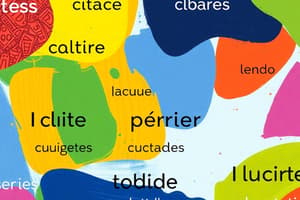Podcast
Questions and Answers
Which adjective would most accurately describe a temporary emotional state using the verb estar?
Which adjective would most accurately describe a temporary emotional state using the verb estar?
- Feliz (correct)
- Rico
- Inteligente
- Valiente
Which of the following phrases is commonly used to express an emotional state in Spanish?
Which of the following phrases is commonly used to express an emotional state in Spanish?
- Yo estoy cansado (correct)
- Ellos son alegres
- Tú eres amoroso
- Ella es triste
What is the correct way to express feeling nervous in Spanish with estar?
What is the correct way to express feeling nervous in Spanish with estar?
- Nosotros estamos nervioso
- Soy nervioso
- Él es nervioso
- Estoy nervioso (correct)
Which of these adjectives cannot be used with estar to describe temporary feelings?
Which of these adjectives cannot be used with estar to describe temporary feelings?
Which combination correctly pairs a temporary emotional state with the verb estar?
Which combination correctly pairs a temporary emotional state with the verb estar?
Flashcards
How to use the verb 'estar' with emotions
How to use the verb 'estar' with emotions
To describe how someone is feeling at a particular moment.
Emotional adjectives in Spanish
Emotional adjectives in Spanish
Adjectives that describe emotional states.
Estar contento/a
Estar contento/a
A Spanish phrase that describes feeling happy.
Estar triste
Estar triste
Signup and view all the flashcards
Estar enojado/a
Estar enojado/a
Signup and view all the flashcards
Study Notes
Emotions and Feelings in Spanish
-
Emotional Vocabulary: Learn common adjectives and phrases for describing emotions. This includes both basic and nuanced terms for different feelings, such as alegría (joy), tristeza (sadness), enfado (anger), miedo (fear), and celos (jealousy). Consider examples of phrases like "estar muy feliz" (to be very happy) and "sentir mucha rabia" (to feel a lot of anger).
-
Estar: Focus on adjectives used with the verb estar to describe temporary emotional states. Examples include estar triste (to be sad), estar enojado (to be angry), estar feliz (to be happy), and estar nervioso (to be nervous). Understand that these describe a temporary state, not a permanent personality trait.
Studying That Suits You
Use AI to generate personalized quizzes and flashcards to suit your learning preferences.




